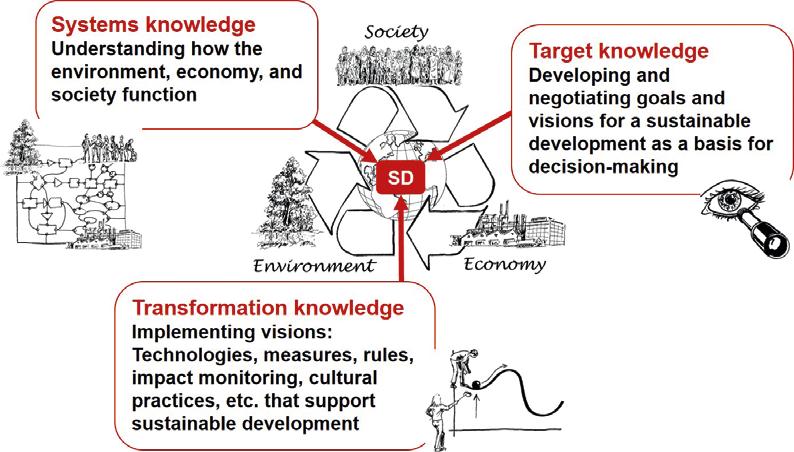
1 minute read
Figure 12: Types of knowledge
from Transdisciplinary Learning for Sustainable Development: Experience in Course and Curriculum Design
Figure 12: Types of knowledge (Design: K. Herweg)
Critical awareness for ESD
Gaining critical awareness enables people to question and critically assess the subjective theories (worldviews, ideas, opinions, beliefs, convictions, etc.) that they developed through their socialization, e.g. within their family, circle of friends, etc. Critical awareness gives them the ability to critically reflect and put these personal convictions into perspective by comparing and contrasting them with scientific theories, and drawing valuable conclusions for their actions. This is a cardinal goal, especially in higher education. Action should primarily be guided not by opinions, but by a professional, evidence-based attitude and consideration of relevant research results. The development of ethical points of reference, moral principles, and honest motives is highly relevant, especially in ESD, as are allowing doubts and dealing with uncertainties. The perfectly self-reflective personality may be very ambitious, but paving the way towards it is paramount.
In view of building “attitudes“ and “values” for SD, Hattie (2011), Haversath (2012), Schubiger (2013), and Stoltenberg and Burandt (2014) provide a number of indications on how to explore pathways from competences to action. We have supplemented these based on our own experience. The following points are considered important to build up attitudes and values supporting engagement in SD, but they do not lead there automatically. Of course, it is also important for the lecturer to demonstrate that they are sincere about and personally engaged in the topic as well.
• Feeling injustice, consternation, empathy, and solidarity with disadvantaged people, species, marginalized sustainability dimensions, etc. can increase the motivation to engage in SD, develop an ownership for action, and develop a sense of responsibility and moral obligation. • Examples relating to students’ contexts and experiences make it easier for them to access SD (small psychological distance). • Doubts, difficulties, searching, critical experience, etc. can trigger reflection processes by the students.
These may e.g. reveal contradictions between one’s norms and values and one’s behaviour, which is a precondition to change one’s mindsets and behaviour. • SD is solution-oriented, which means that learning from problems is essential, but focusing on solutions is more effective, in terms of increasing the expectation of self-efficacy (i.e. one’s own positive impact). • Students’ envisaged actions towards SD may be blocked if they are not compatible with their social context (family, friends); making such contradictions transparent can help overcome these blockages.







